Wizardkind
Redirected from Wizards
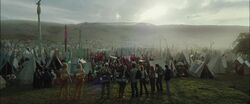 | |
| Wizards and witches | |
|---|---|
| Species information | |
| Sentience | Sentient |
| Related to | |
| Alternative names |
|
| Distinction(s) | Typically wear long robes, carry a wand, and don't use electricity |
| Affiliation | |
| Ministry of Magic Classification | Beings |
| Status | Extant |
Magical ability is an inherited trait usually passed from parent to child. While pure-bloods are born of two wizarding parents and half-bloods are often born of one wizard and one muggle or muggle-born parent, Muggle-born wizards and witches are born with their magical abilities because they are distantly descended from a Squib who often marries into a Muggle family. From this point on, that branch of the wizarding family often loses all traces of its wizarding legacy, which resurfaces many generations later in a Muggle-born descendant.
In childhood, wizards and witches may exhibit random bursts of magic, called accidental magic, which are honed and controlled as they progress in maturity. To perform controlled magic, almost all wizards/witches need to use a wand, although the skill of wandless magic may be mastered in later life. A few highly advanced wizards can do controlled magical acts without a wand, such as Albus Dumbledore, who demonstrated the ability at the close of Harry Potter's first year at Hogwarts School of Witchcraft and Wizardry, and Lord Voldemort, who once demonstrated this ability during the Battle over Little Whinging in 1997.
Contents[show] |
Sub-species
Some wizards exhibit special inborn (or acquired) attributes which mark them as unique amongst their kind. They are listed as follows:Seers Edit
Edit
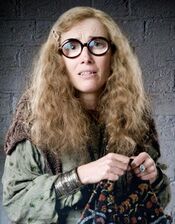
 Added by Peeperman
Added by PeepermanAnimagi Edit
Edit
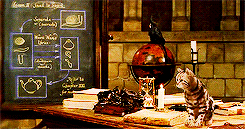
 Added by Cyber-Logic
Added by Cyber-LogicMetamorphmagi Edit
Edit
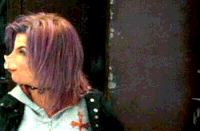
 Added by You-Know-Who
Added by You-Know-WhoCommunicating with animals Edit
Edit
Some wizards and witches have the ability to talk to animals. For instance, a Parselmouth can speak to snakes. This ability is extremely rare. Salazar Slytherin was an infamous Parselmouth, and his descendants, such as Lord Voldemort, inherited this trait. Harry Potter also acquired this ability when part of Voldemort's soul bonded with him the night he tried to kill Harry. When the piece of Voldemort's soul inside him was destroyed, Harry lost this ability. Other wizards, like Rubeus Hagrid for example, have an innate ability to communicate and bond with all kinds of animals. Animagi have also demonstrated being able to subtly influence animals while assuming their animal forms. Squibs Edit
Edit
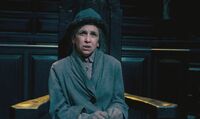
 Added by Smonocco
Added by SmonoccoLate-bloomers Edit
Edit
There exist some individuals that continue to exhibit a lack of magical power past age 11 and yet spontaneously - in desperate circumstances - manage to perform magic later on in life. However, this is rare in the Harry Potter universe, possibly more so than squibs.[1] Legilimens Edit
Edit
Legilimens are people who can perform Legilimency. These people can tune into other people's minds, but have difficulty reading the minds of those people who can perform Occlumency. The act of Legilimens is referred to as mind reading in the Muggle world. Occlumens Edit
Edit
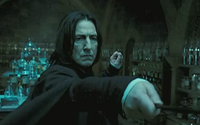
 Added by Scrimgeour
Added by ScrimgeourSocial habits Edit
Edit

 Added by You-Know-Who
Added by You-Know-WhoWizards may live together in communities such as Godric's Hollow or Hogsmeade. Other wizards live in solitary locations such as Spinner's End or 12 Grimmauld Place. Most wizards maintain little if no contact with Muggle society and find Muggles strange and unpleasant. They are somewhat ignorant to the muggle world but in a different manner than muggles as of the Wizarding World. While Muggles are completely unaware of wizards, wizards appear to be ignorant of certain aspects of the muggle world, such as electricity and some modern technology. While certain aspects of muggle society are evident in the wizarding one, wizards seem to be a number of decades if not centuries behind muggles in other areas.
Some wizards do not like to talk about their Muggle relatives. Other wizards, like Arthur Weasley, find Muggles to be highly intriguing. Hermione Granger, a Muggle-born witch, took up Muggle Studies at Hogwarts because she felt it would be fascinating to think about Muggles from a wizarding perspective.
Tidak ada komentar:
Posting Komentar